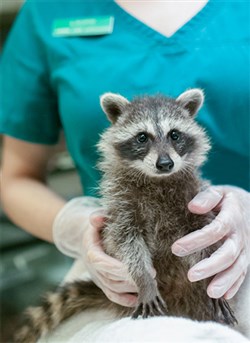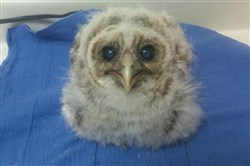VOL. 43 | NO. 38 | Friday, September 20, 2019
‘Because I love it:’ Volunteers rescue Walden’s Puddle
By Larry Woody

Walden’s Puddle wildlife rescue cares for 3,000-4,000 animals in a given year with the goal of returning them to the wild. Educating well-meaning humans also is a big part of its mission.
-- Photograph ProvidedFrom ailing eagles to orphaned opossums, from forsaken fawns to wounded woodchucks, some 120 species of Middle Tennessee wild birds and animals are provided treatment, rehabilitation and a second chance for survival – salvation, in other words – at Walden’s Puddle Wildlife Center of Greater Nashville.
“I wish we could save them all,” says CEO Lane Brody who for nine years has overseen the rehabilitation center for injured and orphaned wild creatures.
“Our return rate (to the wild) is above the national average for similar wildlife rehabilitation centers,” she says. “We’re able to save most of them. That’s what keeps us going.”
Considering that Walden’s Puddle takes in approximately 3,000 to 4,000 furry, feathered and scaly patients a year, that amounts to considerable healing and nurturing.
Walden’s Puddle, which got its namesake from Walden’s Pond in Massachusetts, made famous by naturalist Henry David Thoreau, was founded in 1989 by Vickie Carder in her Donelson home. It moved to Berry Hill for three years, then to the current 14-acre site in the Joelton area.
Brody says the non-profit, which relies entirely on private donations, was “riddled with issues” when she took it over as an “in-kind” CEO.
“It is my way of giving back, my philanthropic work,” she adds. “I don’t take any pay. It stays in the budget for animal care. All of our board members do volunteer work on and off site.
“We are a dedicated force and have brought the Puddle back from the edge. Ninety-two percent of all donations go to the animals. We are rare in the nonprofit world. Our communities’ support is greatly needed.”
Brody says the Puddle is fiscally sound, despite constantly grappling with a $35,000-$40,000 monthly budget. (Caring for one abandoned fawn can cost around $1,000.)
“I put in a lot of 18-hour days,” Brody says. “Why? Because I love it. Every animal we are able to rehabilitate and release makes it all worthwhile.”
A girl and a squirrel
It started with a little girl and an injured squirrel.
“When I was four or five, a squirrel got hit by a car in front of our house,” says Brody, who was born in Oak Park, Illinois (hometown of Ernest Hemingway) and grew up in Racine, Wisconsin. “I took it in and cared for it and it eventually recovered. When I released it, it was such a good feeling …”
Brody was a top jingle singer in Chicago, then moved to California and signed with Capitol EMI. She is a singer, songwriter, actress and concert artist best known for her No. 1 record, “The Yellow Rose,” which she wrote and recorded with Johnny Lee, and her Oscar-nominated country pop hit “Over You.” She has recorded with such notables as Bob Seager, Johnny Mathis and Allison Krauss.
Brody and her husband, legendary sessions drummer Eddie Bayers, have been married 24 years and live in Nashville. She has rescued hundreds of domestic animals in need.
Before stepping up as CEO, Brody and her husband organized and performed benefit concerts for Walden’s Puddle.
Running the Puddle is not piddling.
There are 25 staff members, including animal care director Elisa Fosco. Brody says the Puddle has the only professionally staffed wildlife center in Middle Tennessee.
“We are passion-driven,” adds Fosco, another Chicago native who has three decades of animal-rescue experience. She joined the Puddle a little more than two years ago.
“When I was 11, I volunteered at a veterinary clinic and I’ve been working with animals ever since,” Fosco explains.
“The Nashville area is growing, which means more people bringing in more animals. Development means habitat loss, which results in more animals being displaced. Feeding them is expensive. So is medication and other supplies, along with staffing. It is frustrating to know we could do more if we had more funding.”
In addition to paid staff, the Puddle has a team of about 50 volunteers. They assist in all areas of the organization, from bringing groceries to caring for the most injured animals. Volunteers range in age from a mandatory minimum of 16 to several in their 80s, and include some local veterinarians.
“Working with wildlife is very different from working with exotic and domestic animals,” Fosco says. “Our animals were living their lives in the wild when something happened. We are very respectful of their wild nature and minimize all human contact whenever possible. Our mission is to give wildlife a ‘second chance.’ We rehabilitate the animals and release them back into the wild.”
How long does rehabilitation take?
“Different injuries require different periods to heal,” Brody notes. “In the case of a broken wing, for example, it could be anywhere from weeks to months before the bird is well enough to be able to survive in the wild. Some fractures heal unevenly, others may require extended physical therapy.”
Keeping them wild
In addition to the three primary categories of Puddle patients: ailing, injured and abandoned, there is a fourth category – “pets.”
Although it is a violation of state law to keep any species of wild animal in captivity, some well-intentioned but uninformed people try to keep them as companion animals.

Not all young animals found alone are abandoned. Part of the Walden’s Puddle mission is to help well-meaning humans know when doing nothing is the best option.
-- Photograph ProvidedGenerally, the “cuddle factor” loses its charm when an animal such as a young raccoon or squirrel clamps down on a finger, or tiny fawn matures into a potentially dangerous adult.
“Simply stated, wild animals are not pets,” Fosco says.
“Unfortunately, wild animals raised by humans do not develop behaviors needed to survive in the wild. Survival of the fittest is vital to wild animals, and any abnormal behavior usually impacts the animal’s chance of survival. Sadly, we see these cases far too often.”
Releasing a rehabilitated animal from the Puddle is not as simple as taking it out to a random field or forest and turning it loose.
“Very often animals in rehabilitation lose their territory and have to compete to reclaim their homes,” Brody explains. “When releasing the animal, we also have to consider the population that already lives there. For example, if we release a group of squirrels, they will dig up what the resident squirrels have worked hard to store up for winter.”
The landowner must grant permission for any animals to be released on the property.
Certain species, such as box turtles, require special consideration.
“A box turtle spends its life in a familiar home area, and if they are moved, they spend the rest of their days trying to get home,” Brody says. “If you see one in your yard, let it be. If you see one in the road, move it to a safe area, preferably in the direction it was heading.”
How does a box turtle know where “home” is?
Nobody knows. But it knows.
Checking in
All admissions to the Puddle must be made by advance appointment.
Those who find a wild animal they think needs attention must call the office (615 299-9938) and leave a message. A recording provides additional information about how to deal with and care for the animal. A staffer will return the call and walk through the situation.
Receptionist coordinator Joane Gelep has been fielding calls at the Puddle and dispensing advice for 21 years.
“I got involved when I took an injured bird to Walden’s Puddle and had no money to donate, so I offered to donate my time instead,” she recalls. “I’ve been here ever since. I do it because I love the animals.”
Gelep could be described as the Puddle’s first-responder.
She discusses the situation with the caller and determines what should be done – release the animal or bring it in – and explains other procedures.
“For example, if someone calls to say they found a baby animal in the wild, we access the situation to determine the best plan for the animal,” Gelep says. “In the case of a baby animal, very often it can be returned and reunited with its family. If the animal needs to come in, we schedule an appointment.”
Gelep says she received 71 calls one day, “and every one was different. No two situations are exactly alike, and it may take 10 minutes to talk through each one.”
The Puddle accepts no domestic species – no dogs, cats, hamsters or farm animals.
Concerns about domestic animals should be directed to a local Animal Control center, not to the Puddle.
As for wild creatures, the sky’s the limit – literally.
The Pond receives two or three injured eagles a year, along with hawks, owls and songbirds. Some of the injuries resulted from flying into power lines or windows, some became snared in discarded fishing line, and some were wounded by gunshots – despite being protected species.
Some of other common Pond patients are raccoons, squirrels, opossums and fawns.
“Springtime used to be our busy time of year, because that’s when most wild animals are born,” Brody says. “But as the climate changes, so are the birthing seasons for many wild species.”
Invasive species are not turned away.
“In recent years we’ve started receiving more and more armadillos and coyotes,” Brody says of the Southwest and Western natives that have migrated into the state.
No adult deer or wild turkeys are accepted, nor are bats and venomous snakes.
The reason for the latter is obvious – a bite from a venomous snake is serious and can occasionally be fatal. As for bats, they are known to carry the rabies virus and are deemed too hazardous for workers.
Raccoons likewise sometimes carry the rabies virus, but the disease tends to be isolated in specific areas. The Tennessee Wildlife Resources Agency keeps the Puddle apprised on those locations.
Distemper and mange are concerns, and Gelep advises callers about how to recognize the symptoms and how to proceed.
All staff workers and volunteers are vaccinated against the rabies virus, with booster shots given regularly. No worker has ever been infected.
Skunks, despite their reputations for being little stinkers, are admitted until six months old.
Unique partnership
Walden’s Puddle works in concert with the TWRA, which offers seminars for volunteer workers and frequently refers calls about injured or abandoned wildlife to the Puddle people. The TWRA does not treat ailing or wounded animals.
There is an irony to the affiliation: The TWRA is financed primarily through the sale of hunting and fishing licenses. While the Agency devotes considerable resources to the management and protection of “watchable wildlife” such as songbirds, its primary role is to manage game animals and fish specifically for (euphemistically speaking) “harvesting.”
Brody declines to proselytize about the touchy subject.
She says simply she is a “life-long animal lover” and a “devout vegan” who doesn’t eat animals or animal products.
Meanwhile, she continues to do what she has done for most of her life when it comes to animals: strive to rescue every in-need wild creature she can. In that pursuit, she tirelessly champions the cause and solicits donations, which are the Puddle’s life’s-blood.
“We receive no public funding,” Brody says. “We rely entirely on private donations, and it is an ongoing struggle, with rising costs and increased demands. We desperately need all the help we can get in all areas.”
Brody says the Puddle’s biggest single donation to date is $45,000.
The smallest?
“A jar of change some children collected at school,” Brody says. “They said they wanted to help rescue animals.”
She says they reminded her of a little girl she used to know.